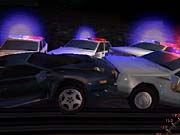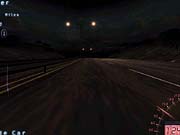Bereft of the options and depth that turn a quick thrill into a long-term proposition, Xicat Interactive's arcade racing game Hot Wired would probably make a great game demo. Unfortunately, this temporarily enjoyable yet incredibly shallow work is not a demo at all. It is instead the completed final retail product, and as such simply doesn't deliver nearly enough intrigue or complexity even for its budget-conscious $19.99 price point.

Conceptually, Hot Wired sounds interesting enough. According to Xicat, players are asked to steal cars "from all over the United States" and thus become "the greatest car thief of all time." Yet in practice, the Hot Wired experience is far less interesting. That the actual act of thievery--a potentially exhilarating undertaking for any joystick-pushing car crook--is completely disregarded in the game is just one in a long list of problems and frustrations found in Hot Wired.
The Hot Wired formula is dead simple. You speed along predetermined chunks of roadway while sadistic police cruisers do their best to smash and crash you car into a stationary hunk of metal. Make it to the finish line of a given zone without being totally crunched and you'll unlock the next zone, and so on. The game supplies 10 such sub-five-minute raceways, each supposedly situated in and around major North American urban sprawls such as New York, Dallas, and Los Angeles. Yet the sad truth of the matter is that all 10 are virtually interchangeable.
First and foremost, the game consistently unfolds under the cover of darkness. This is night driving all the way, with the only visual indications of a world outside the designated stretches of pavement being the occasional spotlighting effect and a series of silhouettes on the distant horizon. In fact, the game is so frightfully dark that you'll be hard-pressed to remember where you are or even perceive such immediate roadside hazards as raised meridians or traffic barriers until you're almost upon them. Moreover, each environment seems nearly identical to all the others. Certainly the game's roller coaster road structure, demolition derby approach, and varying track lengths do spice things up a bit, but there is little doubt you'll encounter many of the same twists and turns in Portland or New York as you'd find in any other area. Nevertheless, once a raceway has been chosen, it's time to "steal" a car. Initially, you'll have two from which to choose, each an imaginary and very modernistic beast that looks and behaves suspiciously like a Lamborghini or Ferrari. As the game progresses, you'll be offered five more vehicles, including a cop car, an Austin Mini look-alike, and a five-ton truck. Curiously, all but the truck, which is built to take a pounding without succumbing, are vastly inferior to the two you are handed at the beginning of the game.
It's in this car-selection process where the concept of car theft begins to break down. In fact, the program itself seems unclear as to whether your cars are stolen or purchased. Simply, you're presented with a paycheck at the end of each successful mission, which you'll then use to buy another vehicle. You'll then take that vehicle out for a spin and try to accumulate enough money to buy another vehicle. If you're unsuccessful with the new car on the new and more difficult track--which is made more difficult solely by the presence of even more police cruisers--there's nothing to stop you from going back to an easier track, then repeating the process over and over again until you own all the cars. Whether you really need to see all the circuits after you've driven the first half dozen or so is determined by how much repetition you can handle. As Hot Wired has no career mode, you will have experienced all there is to experience within the first several hours. The act of stealing a car or even the implied act of stealing a car never really enters into it.

On the road, the game is horribly uneven. Humungous semitrailers scoot along as nimbly as $200,000 sports cars. The vehicle physics model, which at best is evocative of the very first Need for Speed game, loses any sense of grip and logical reaction whenever it loses traction. Car and object clipping becomes almost unbearable at times, and the camera goes through all manner of visual gymnastics at just the slightest hint of contact. Off the track, Hot Wired is almost ridiculously simplistic. Joystick button assignments are permanently fixed, the level of difficulty is preset, and graphics are adjustable to just one of three universal settings--low, medium, and high. Multiplayer Hot Wire is not permitted, nor are garage modifications or repairs.
Budget games are a great idea, but not at the expense of quality craftsmanship. Although Hot Wired does offer a tolerable arcade racing experience, a bushel of camera perspectives, and a bizarre yet amusing car damage model, it is woefully short of options, undersized, and not nearly up to the expectations it sets up. For a similar concept and price yet a superior experience, racers on a budget would do well to check the bargain bins for past versions of Electronic Arts' Need for Speed series and leave this one for those who don't know any better.